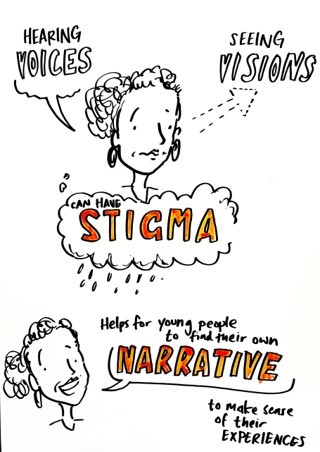The ChUSE Trial is now available for up to 60 young people aged 8-15 years old who experience distressing sensory experiences, such as hearing voices or seeing visions others can't. To request information, please contact chuse@gmmh.nhs.uk. We recommend you also speak with your CAMHS practitioner, who can arrange a referral for you.
The ChUSE trial is a child-focused and parent intervention, increasing choice in NHS services for children and young people with unusual sensory experiences.
The trial is led by Dr Sarah Parry, strategic research lead for our young people's mental health research centre, through a collaboration between Pennine Care and Greater Manchester Mental Health NHS:
“We are delighted this feasibility trial has received funding from the National Institute for Health and Care Research. The ChUSE talking therapy for children in CAMHS, and parents/carers was developed over six years by engaging with experts by experience and conducting preparatory research to design the ChUSE approach for testing. We really hope this intervention will offer young people with distressing sensory experiences in Greater Manchester and their parents the information, reassurance, and coping skills we have heard would be helpful.”
What is the ChUSE trial about?
 Distressing sensory experiences, such as hearing voices, seeing visions, or feeling presences others don't, are often associated with emerging signs of psychosis.
Distressing sensory experiences, such as hearing voices, seeing visions, or feeling presences others don't, are often associated with emerging signs of psychosis.
These experiences are surrounded by stigma, which can make young people and their parents very anxious. It is this anxiety that often leads young people and families to seek help from children’s mental health services.
Very few of these children will receive a diagnosis of early-onset psychosis, unusual sensory experiences are a common developmental phenomenon, but the anxiety surrounding distressing sensory experiences can cause difficulties for the young person in their day-to-day lives, schooling, and relationships.
Anxiety about distressing sensory experiences can make the symptoms more frightening and harder to ignore, which is why it is so important children and families can access timely support.
Many mental health practitioners feel ill-equipped to offer psychological therapies for distressing sensory experiences due to a lack of national clinical guidelines and child-centred research to inform their approach.
Delayed access to support often increases anxiety further, exacerbates family stress, and often worsens the original symptoms. Parents have explained: “There is a massive gap in services with zero services being available for someone experiencing voices so young”.
Without suitable support, the overall wellbeing of the family can decrease rapidly, reducing their abilities to cope.
Since 2016, our research team has grown to include clinical academics and experts by experience.
We have held local and national events to hear about people’s priorities for designing support, explored existing gaps, and collaboratively developed public information resources to gather feedback on what helpful support looks like and includes.
We have also conducted primary and secondary research to explore unmet needs, experiences of accessing support, and what is currently known. The ethos and content of the ChUSE intervention has evolved from this work.
The ChUSE intervention aims to support young people and their parents to learn new information and coping skills, to manage distressing sensory experiences, and improve overall wellbeing.
The study has two parts. Firstly, we will ask 30 children (aged 8-15-years-old) and their parents to take part in the ChUSE talking-therapy intervention and parent-training programme, to develop skills and understanding in relation to distressing sensory experiences.
30 children will also join the study and receive the care that would usually be provided.
Secondly, the children, parents/carers and practitioners who take part will be invited to give detailed feedback so we can see what difference the intervention makes, learning from their insights.
Findings will be shared with participants, the NHS, published in scientific journals and across media platforms.
We will work with service commissioners nationally to develop services for children with distressing sensory experiences, consider next steps for further research, enhancing access to timely talking-therapies and family-focused care for children with distressing sensory experiences.
- Sarah Parry, principal investigator, Pennine Care
- Filippo Varese, co-principal investigator, University of Manchester
- Fiona Malpass, PPIE lead, Voice Collective
- Tony Morrison, co-applicant, University of Manchester
- Sue Kirk, co-applicant, University of Manchester
- Gemma Sheilds, co-applicant, University of Manchester
- Lesley-Ann Carter, co-applicant, University of Manchester
- Daniel Freeman, co-applicant, University of Oxford
-
Dr Claire Hilton, trainee clinical psychologist
-
Megan King, trainee clinical psychologist, University of Manchester
